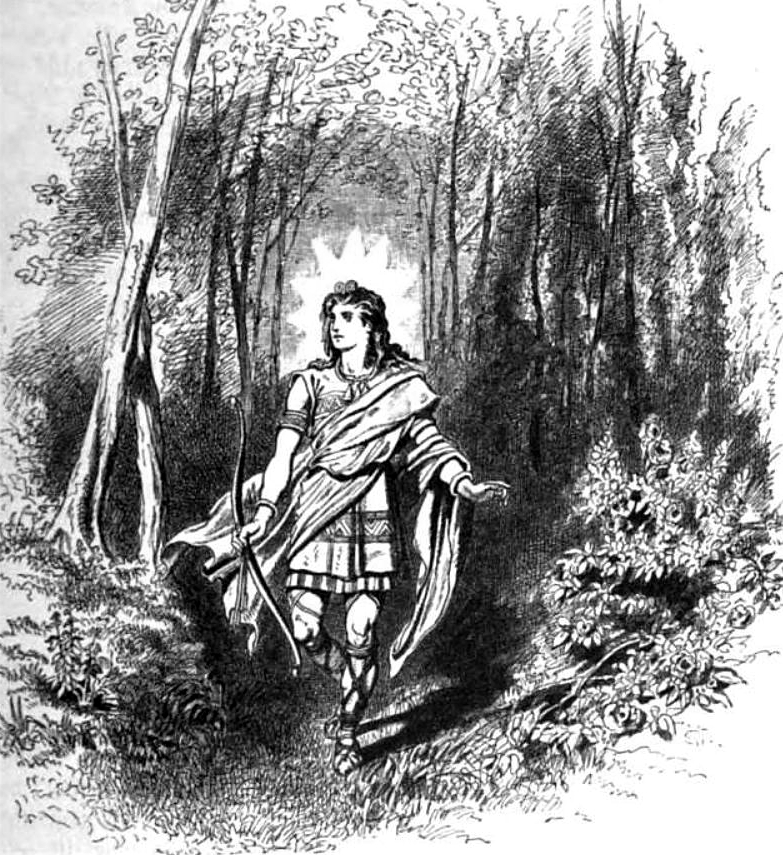In Norse mythology, Váli is the god of vengeance. He is the son of the all-father Odin (Old Norse Óðinn) and the Æsir giantess (a jötunn) Rindr.
This Norse deity was also born to avenge his brother Baldr, but more on that below.
What was Váli God of?
It is Váli’s (pronounced like the word ‘valley’) birthright to be a god of vengeance, although he has to share that title with Vidar, his brother.
Vidar and Váli are sons of Odin, and both were born with a particular purpose. Old Norse myths indicate that both gods of vengeance were created only to deliver punishment to anyone who dared harm any member of Odin’s family.
Váli’s Confusing Parentage in Old Norse Literature
Piecing together an accurate picture of the story of Váli is difficult, as the Norse sources are sparse and sometimes confusing.
The Gylfaginning (‘The Beguiling of Gylfi in Old Norse’) section of the Prose Edda, written by Snorri Sturluson, confusingly describes Vali as Loki’s son in a single passage. The transcription states:
Þá váru teknir synir Loka, Váli ok Nari eða Narfi.
Which translates to:
Then were taken Loki’s sons, Váli and Nari.
Vidar and Vali – Germanic Mythology
But, many believe that this Váli is often misdescribed as the son of Loki. Although not intentional, scholars believe this is an early transcription error.
Other instances of the Gylfaginning describe Váli as Odin’s son, which is more commonly believed and referenced in the available sources. However, current copies of the original mistaken text again argue with this.
Váli’s Family Relations to other Norse Gods
Many scholars believe that Váli is indeed the son of the god Odin and the giantess Rindr, reiterated in a translation by Ursula Dronke, where the Váli myth is referred to in the Eddic poem Baldrs draumar (Balder’s dreams).
The translation states:
Rindr will bear Váli
in western halls;
that son of Óðinn” brother to Baldr, Thor, and Víðarr.
Vǫluspá and Baldrs draumar – Academia Edu
Váli is part of a big family with numerous brothers, including:
- Thor
- Balder
- Vidar

The Story and purpose of Váli in Norse mythology
Three sources tell the story of Váli (anglicized as Vali); Völuspá in the Poetic Edda, the Gylfaginning in the Prose Edda, and the Gesta Danorum in Deeds of the Danes. A tale of prophecy ensues.
Váli was born for the sole purpose of killing Höðr (anglicized as Hod) to avenge Balder. Höðr was an unwitting participant and never meant to kill Baldr.
Most Germanic and Scandanavian myths begin in adulthood. In contrast, Váli’s story is one of the few Norse myths that provide details of his birth, childhood, and adulthood.
Váli’s story begins with his father, Odin. Odin dressed as a woman to seduce and impregnate the giantess goddess Rindr. The all-father’s only purpose was to spawn a son who would avenge Baldr’s death.
After his birth, Váli grows at an extraordinary rate, becoming a man in only one night and fulfilling his purpose of slaying Balder’s accidental killer and his half-brother, Höðr.
The story goes that all the other Norse gods amuse themselves by throwing things at Baldr, knowing nothing could harm him. Of course, Loki, the trickster god, asked Höðr if he wanted to join in.
Höðr did not realize that he was hurtling mistletoe at Baldr, the only thing that could hurt him. Many believe that after Baldr’s funeral, the giantess Thökk, probably Loki in disguise, could release Balder from death by releasing her tears, but she refused.
Later in the story of Ragnarök, Váli would then bind Loki with the entrails of his Norse son Narfi.
This is where his story gets messy. When Loki is dragged into the cave to his doom, the Norse myth tells how the Æsir changed Vali into wolf form. Vali then tore into the flesh of Narfi.
Does Váli Survive Ragnarök?
The old Norse word Ragnarök translates to ‘doom of the gods.’ Scandinavian and German mythology relates to the end of the world of gods and men. Most of the Norse gods are prophesied not to survive Ragnarök.
Some sources suggest there may have been some known surviving gods, with Váli prophesied to be one of the surviving Viking gods.

